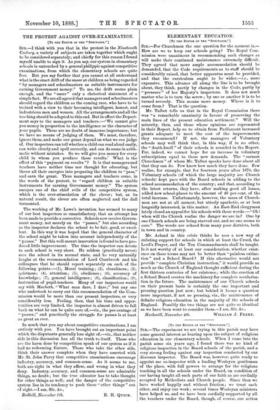THE PROTEST AGAINST OVER-EXAMINATION.
[To THE EDITOR OF THE "13111CTATOE."] SIR,—I think with you that in the protest in the Nineteenth Century, a variety of subjects are taken together which ought to be considered separately; and chiefly for this reason I found myself unable to sign it. As you say, our system in elementary schools is untouched by a general philippic against competitive examinations, from which the elementary schools are quite free. But you say further that you cannot at all understand what is the exact drift of the sneer at children as being regarded ‘` by managers and schoolmasters as suitable instruments for earning Government money." To me, the drift seems plain enough, and the "sneer" only a rhetorical statement of a simple fact. We are all agreed that managers and schoolmasters should regard the children as the coming race, who have to be trained with a view to their becoming intelligent, honest, and industrious men and women. All the arrangements and all the teaching should be adapted to this end. But in effect the Depart- ment says to the managers and teachers We cannot give you money in proportion to the intelligence or the character of your pupils. These are no doubt of immense importance; but we have no means of judging of them. We must, therefore, ignore them, and make our grant depend on what we can judge of. Our inspectors can tell whether a child can read aloud easily, can write clearly and spell correctly, and can do sums in arith- metic without mistakes. So we will give you money for every child in whom you produce these results.' What is the effect of this "payment on results "? It is that managers and teachers have neither time nor thought for educating, but throw all their energies into preparing the children to "pass,"
and earn the grant. Thus managers and teachers come, in the words of the protest, to "regard children as suitable instruments for earning Government money." The system escapes one of the chief evils of the competitive system, which is the over-stimulation of the clever; but, as its natural result, the clever are often neglected and the dull tormented.
The working of Mr. Lowe's invention has seemed to many of our best inspectors so unsatisfactory, that an attempt has been made to provide a corrective. Schools now receive Govern- ment money, not merely on the "passes," but also according as the inspector declares the school to be fair, good, or excel- lent. In this way it was hoped that the general character of the school might be taken into account independently of the "passes." But this well-meant innovation is found to have pro- duced little improvement. The time the inspector can devote to each school is very short. He seldom (practically never) sees the school in its normal state, and he very naturally laughs at the recommendation of Lord Cranbrook and his colleagues that he should report separately on each of the following points :—(1), Moral training ; (2), cleanliness ; (3), quietness; (4), attention ; (5), obedience ; (6), accuracy of knowledge ; (7), general intelligence ; (8), classification ; (9), instruction of pupil-teachers. Many of our inspectors would say with Macbeth, "What man dare, I dare ;" but any one who undertook to carry out this recommendation of the Com- mission would be more than our present inspectors, or very considerably less. Feeling, then, that his time and oppor- tunities are very limited, the inspector is almost driven to fall back on what he can be quite sure of,—viz., the per-centage of "passes ;" and practically the struggle for passes is at least as great as ever.
In much that you say about competitive examinations, I am entirely with you. You have brought out an important point which the disputants generally lose sight of,—viz., that neither side in this discussion has all the truth to itself. Those who see the harm done by competition speak of our system as if it had no redeeming feature. Those who take the other side, think their answer complete when they have asserted with Mr. St. John Parry that competitive examinations encourage industry, accuracy, and common-sense. As it seems to me, both are right in what they affirm, and wrong in what they deny. Industry, accuracy, and common-sense are admirable things, no doubt ; but the true educator has to take thought for other things as well ; and the danger of the competitive system lies in its tendency to push these "other things" out of sight.—I am, Sir, &c.,






































 Previous page
Previous page